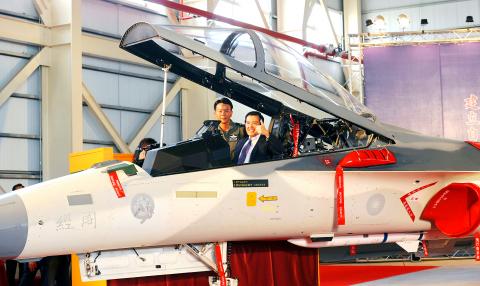With efforts to acquire F-16C/D aircraft from the US in limbo, the air force was yesterday given a shot in the arm when it received the first six of a planned 71 upgraded multi-role Indigenous Defence Fighters (IDF).
The F-CK-1A/B MLU (“mid-life upgrade”) was unveiled during a handover ceremony at the Aerospace Industrial Development Corp (AIDC, 漢翔航空) plant in Shalu (沙鹿), Greater Taichung, attended by top brass and scores of politicians, including President Ma Ying-jeou (馬英九), Deputy Minister of National Defense Chao Shih-chang (趙世璋) and Taichung Mayor Jason Hu (胡志強).
Years in the making, the upgrade involves a revamping of the aircraft’s avionics and flight control systems, a triple-color heads-up display and anti-electronic jamming functions, as well as the full integration of air-to-ground and air-to-air missiles developed by the Chungshan Institute of Science and Technology (中山科學研究院), such as the Tien Chien II “Sky Sword.”

Photo: Sam Yeh, AFP
It is reported that the aircraft will also be fit to carry the Tien Chien IIA anti-radiation missile, which remains under development. The aircraft can now carry four air-to-air missiles, from two on the original model.
Although it had been previously reported that the upgraded aircraft would have a greater operational range, the range is unchanged, and the twin Honeywell F125-70 afterburning turbofan engines are the same as on the original model.
The first six revamped aircraft, which are part of a US$588 million first phase of upgrades, are to join the 443 Tactical Fighter Wing in Greater Tainan.
Shiah Kang (夏康), senior vice president at state-owned AIDC, told the Taipei Times that between 28 and 30 F-CK-1A/B MLUs were scheduled for delivery this year, with the remainder due by the end of next year.
Shiah said that depending on the budget, the remainder of the IDFs in the air force, or 56 aircraft, could be upgraded as part of an MLU-2 program.
Under phase two of the project, AIDC would provide the air force with a range of options to meet a variety of tactical requirements, he said.
Addressing the ceremony, Ma said that when the IDF, a domestic program, was being developed in the 1980s after the US refused to sell Taiwan F-20s and F-16s, skeptics would jest that IDF stood for “I don’t fly.”
Over the years, the meaning of the acronym has changed and I hope it can now stand for “I do fight” and “I don’t fail,” Ma said.
The initial IDFs were introduced to the air force in 1994, with the first revamping program launched in 2000.
While the upgrade points to advances in Taiwanese avionics and capabilities, defense experts and Lockheed, maker of the F-16, say the new IDF is insufficient to ensure parity with an increasingly modern People’s Liberation Army Air Force.
In addition to the IDF program, a US$4.5 billion plan to upgrade Taiwan’s fleet of 144 F-16A/Bs is expected to commence later this year or next year.

Tropical Storm Gaemi strengthened into a typhoon at 2pm yesterday, and could make landfall in Yilan County tomorrow, the Central Weather Administration (CWA) said yesterday. The agency was scheduled to issue a sea warning at 11:30pm yesterday, and could issue a land warning later today. Gaemi was moving north-northwest at 4kph, carrying maximum sustained winds near its center of up to 118.8kph and gusts of 154.8kph. The circumference is forecast to reach eastern Taiwan tomorrow morning, with the center making landfall in Yilan County later that night before departing from the north coast, CWA weather forecaster Kuan Shin-ping (官欣平) said yesterday. Uncertainty remains and

SEA WARNING LIKELY: The storm, named Gaemi, could become a moderate typhoon on Wednesday or Thursday, with the Taipei City Government preparing for flooding A tropical depression east of the Philippines developed into a tropical storm named Gaemi at 2pm yesterday, and was moving toward eastern Taiwan, the Central Weather Administration (CWA) said. Gaemi could begin to affect Taiwan proper on Tuesday, lasting until Friday, and could develop into a moderate typhoon on Wednesday or Thursday, it said. A sea warning for Gaemi could be issued as early as Tuesday morning, it added. Gaemi, the third tropical storm in the Pacific Ocean this typhoon season, is projected to begin moving northwest today, and be closest to Taiwan on Wednesday or Thursday, the agency said. Today, there would likely

DISRUPTIONS: The high-speed rail is to operate as normal, while several airlines either canceled flights or announced early departures or late arrivals Schools and offices in 15 cities and counties are to be closed today due to Typhoon Gaemi, local governments announced last night. The 15 are: Taipei, New Taipei City, Taoyuan, Tainan, Keelung, Hsinchu and Kaohsiung, as well as Yilan, Hualien, Hsinchu, Miaoli, Chiayi, Pingtung, Penghu and Lienchiang counties. People should brace for torrential rainfall brought by the storm, with its center forecast to make landfall on the east coast between tonight and tomorrow morning, the Central Weather Administration (CWA) said. The agency issued a sea warning for the typhoon at 11:30pm on Monday, followed by a land warning at 11:30am yesterday. As of

CASUALTY: A 70-year-old woman was killed by a falling tree in Kaohsiung as the premier warned all government agencies to remain on high alert for the next 24 hours Schools and offices nationwide are to be closed for a second day today as Typhoon Gaemi crosses over the nation, bringing torrential rain and whipping winds. Gaemi was forecast to make landfall late last night. From Tuesday night, its outer band brought substantial rainfall and strong winds to the nation. As of 6:15pm last night, the typhoon’s center was 20km southeast of Hualien County, Central Weather Administration (CWA) data showed. It was moving at 19kph and had a radius of 250km. As of 3pm yesterday, one woman had died, while 58 people were injured, the Central Emergency Operation Center said. The 70-year-old